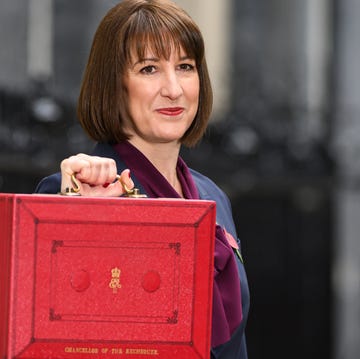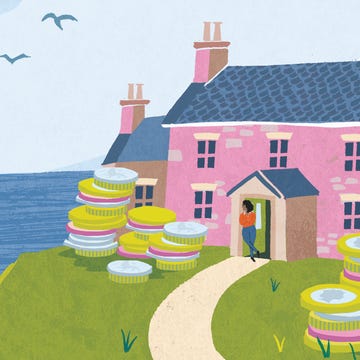As any first-time buyer will know, there are no shortage of hurdles to getting on the property ladder: high house prices, eye-watering mortgage rates and skyrocketing rents that make it difficult to save enough for a deposit. We hear ya!
But there are finally some encouraging signs that mortgages are about to get more affordable as lenders start to battle it out in the first-time buyer arena. Just weeks after Halifax and Lloyds announced new buyers could take out loans up to 5.5 times annual household income income, Nationwide has upped the stakes, and is the first major lender to offer first-time buyers the ability to borrow six times their income.
Nationwide’s move has been described as “a gamechanger for first-time buyers" by Nicholas Mendes, a mortgage technical manager at the broker John Charcol, who added that it will “deliver a powerful boost” towards tackling the significant affordability issues that have locked many out of home ownership.
Nationwide is also the first big lender to cut its mortgage rate to under 5% and increase its maximum loan size to 95% LTV for first-time buyers. This means a first-time buyer couple with a joint income of £50,000 could borrow up to £300,000, assuming a 5% deposit.
So, with mortgage rates coming down, could this be the year you buy your first home? If so, it's time to work out how you're going to achieve it. Here’s everything you need to get you started, from raising a deposit to finding the right mortgage.
Where should I start and how can I find a mortgage calculator?
Many first-time buyers are now looking at more expensive properties, averaging £249,100, according to Zoopla, with demand for first homes rising 20% year on year.
Firstly, you need to work out how much you need to save for a deposit, what house price you can afford (keeping in mind the mortgage you'll need) and roughly what timeframe you want to give yourself to achieve this by.
As a ready reckoner, use an online widget such as the mortgage calculators offered by sites like MoneyHelper and MoneySuperMarket. These will look at your income and monthly household costs to calculate what you can afford and what kind of mortgage you could get.
"If your buying power has been affected by higher mortgage rates, it could be worth considering buying a smaller property as your first step on the ladder, or broadening your search and purchasing in a cheaper area," says Zoopla's consumer expert, Dan Copley.
How can I save for a deposit?
Once you know how much you need to save, make your money work harder for you by choosing an option that will maximise your assets. Lifetime ISAs are designed specifically for first-time buyers so make the most of the tax-free saving.
Lifetime ISAs
An estimated 11% of first-time buyers with a mortgage used a Lifetime ISA to get onto the property ladder in the most recent year there's data for (2022-23), according to Hargreaves Lansdown. A Lifetime individual savings account (or LISA) can be used towards a deposit on a first home or towards a pension. This type of ISA is available to anyone aged 18 to 39, is tax free and allows you to save up to £4,000 each year – the government adds 25% to whatever you save. This means if you put in the maximum amount yearly, the government will add £1,000 to your account. But if the money is withdrawn for any other reason, there is a 25% penalty charge. You also need to have held the LISA for at least 12 months before using it to buy a first property.
Watch out if you are buying in an expensive area. The maximum eligible property value for which you can use your LISA hasn't been increased from the £450,000 limit since it was launched six years ago and is now lagging behind the increase in property values.
Help to Buy ISAs were the forerunner to LISAs. You can no longer open these but if you already have one you can pay into it up to £200 each month. As with a LISA, the government will top up your savings by 25% when you buy your first home. You can pay into the ISA until November 2029. You can claim the 25% bonus until November 2030. Find out more at gov.uk.
Stamp duty exemption freeze to end
Currently, first-time buyers in England and Northern Ireland only pay Stamp Duty if their home costs more than £425,000 but that's set to drop to £300,000 in March 2025. However, there is pressure on the new government to focus on Stamp Duty in the Autumn budget.
The rates vary in Scotland and Wales – use the HomeOwnersAlliance stamp duty calculator to find out what you’d have to budget for.
What if I need my parents' help to buy?
There are a number of guarantor mortgages available for this scenario, where a parent or grandparent promises to cover the mortgage repayments if the home buyer fails to pay. Brian Murphy, head of lending at the Mortgage Advice Bureau explains how it works: "You are guaranteeing that you can make the repayments on the borrower’s mortgage, should you need to. You will be named on the mortgage, but you won’t own a share of the property, nor will your name be on the deeds. You’re purely responsible for making the repayments, should the borrower fall behind. For this reason, people tend to be guarantors only to those they know really well, and are usually parents or a close family member."
You can also use your savings to offset the mortgage. "You’ll have a savings account that is essentially provided by the mortgage lender," says Brian. "Depending on the terms of the mortgage, there will be restrictions on when and how much money you can withdraw from the account until a certain amount of the mortgage has been paid off or the level of equity has increased beyond a specific loan to value.”
For instance, the Barclays Family Springboard mortgage uses your family or friends' savings to get your own no-deposit mortgage and pay them back with interest. Tipton’s Family Assist Mortgage allows the first-time buyer to borrow 100% of the purchase price or property value (whichever is lower). In place of a deposit, a relative will need to secure 20% of the total amount borrowed against their own property, or put 20% or the total amount borrowed into the Family Assist account.
Check out the guarantor mortgage options at comparison sites, such as MoneySuperMarket or Money.co.uk, and check with your own bank what they offer.
Seek independent financial advice before making a decision. You can find an FCA-regulated financial advisor at Unbiased or Vouchedfor.
Other mortgage options
*Nationwide's Helping Hand mortgage now gives first-time buyers the option of borrowing up to six times their income when taking a five or ten-year fixed rate up to 95% Loan-to-Value (LTV). This will give potential homeowners a 33% uplift versus Nationwide’s standard lending at 4.5 times income.
*Lloyds Bank's new First Time Buyer Boost mortgage increases the amount you can borrow by up to 22% more than the bank would normally lend. At least one person applying must be a first-time buyer. You must have a deposit of 10% or more and the total household income of everyone applying must be a minimum of £50,000.
*Skipton Building Society has a 100% Track Record mortgage that doesn't require a guarantor. Renters struggling to save for a deposit can now access this five-year fixed mortgage without having savings to put down as a deposit. You will only be able to borrow the equivalent or less of what you pay in rent each month. So how much property this will buy you (if any at all) will depend on where you live. You will need to be a first-time buyer, be at least 21 years old, have paid your rent in full and on time for a minimum of 12 months, and have a good credit history.
*Leeds Building Society, in partnership with Experian Boost, has a scheme that takes into account a borrower’s good financial track record when carrying out mortgage checks. This means the last 12 months’ of regular debit payments, such as your council tax and subscriptions to digital entertainment services like Netflix or Spotify, can now contribute to your credit scores and be factored into mortgage applications to Leeds. The scheme is available on single and joint application mortgages.
What else is available for first time buyers?
There are government schemes available to make first-time home ownership more affordable. Paula Higgins, CEO of the Home Owners Alliance says "It's a confusing picture for first-time buyers to understand what government support is out there. The Help to Buy programme is still closed and there's no noise yet from the new government about restarting it. But they are more committed to making the mortgage guarantee scheme a long term proposition. It will be called Freedom to Buy, the details are light at the moment but it’s understood it will work along the lines of the existing mortgage guarantee scheme. More news is expected in the Budget."
Shared ownership, where you buy a portion and pay rent on the rest, is also an option for those on lower incomes who would not be able to purchase a home on the open market.
In 2021, the government announced a First Homes programme offering a 30%-50% discount on new homes for eligible first time buyers. Find out if you are eligible at gov.uk.
The home can be a new home built by a developer, or a home you buy through an estate agent, which someone else bought before through the scheme. The scheme is only available in England. "While First Homes has met its initial target o f1500 new homes by the summer 2023, it's still a drop in the ocean," says Paula.
What if I want to buy a house with my partner?
As part of your planning process, you’ll need to factor in whether you’re buying on your own or with a partner or parent. Buying with a partner is obviously a huge commitment.
*If you’re moving in with your partner but are not married, and you’re putting in different amounts of money, experts tend to recommend buying as ‘tenants in common’. Owning the property as tenants in common means, in the event that you later go your separate ways, the sale proceeds would be divided according to each party’s respective share.
*Get a Declaration of Trust (or Deed of Trust) drawn up. This is a is a legally-binding document recording the financial arrangements between joint property owners, including what share of the property each owns and what should happen in various eventualities. While there are templates for drawing this up on your own, it’s highly advisable to use a solicitor as this is a legally-binding document.
*Setting up a ‘cohabitation' or 'living together agreement’ is also a good idea – this can cover other financial matters as well as your property and will outline what will happen should the relationship end. Ben Evans, lead solicitor in family law at Co-op Legal Services says: “This can help by setting out how a couple wish their financial matters to be dealt with upon separation and how any children should be provided for.
"Such agreements can give reassurance to all parties that the potential of a bitter dispute has been avoided by some simple thought and planning given at the outset of the relationship," he says. "If you were to still end up in court, the Judge will take into account the co-habitation agreement, as it clearly sets out your wishes in writing."
Bookmark these:
- Check out MoneySavingExpert’s guidance on the mortgage guarantee scheme
- Check out the government website for details on the Shared ownership and First Homes Scheme
- Use MoneyHelper’s stamp duty calculator
- Find a mortgage broker via Unbiased or Vouchedfor.
- The HomeownersAlliance has a wealth of information for first time buyers.
















